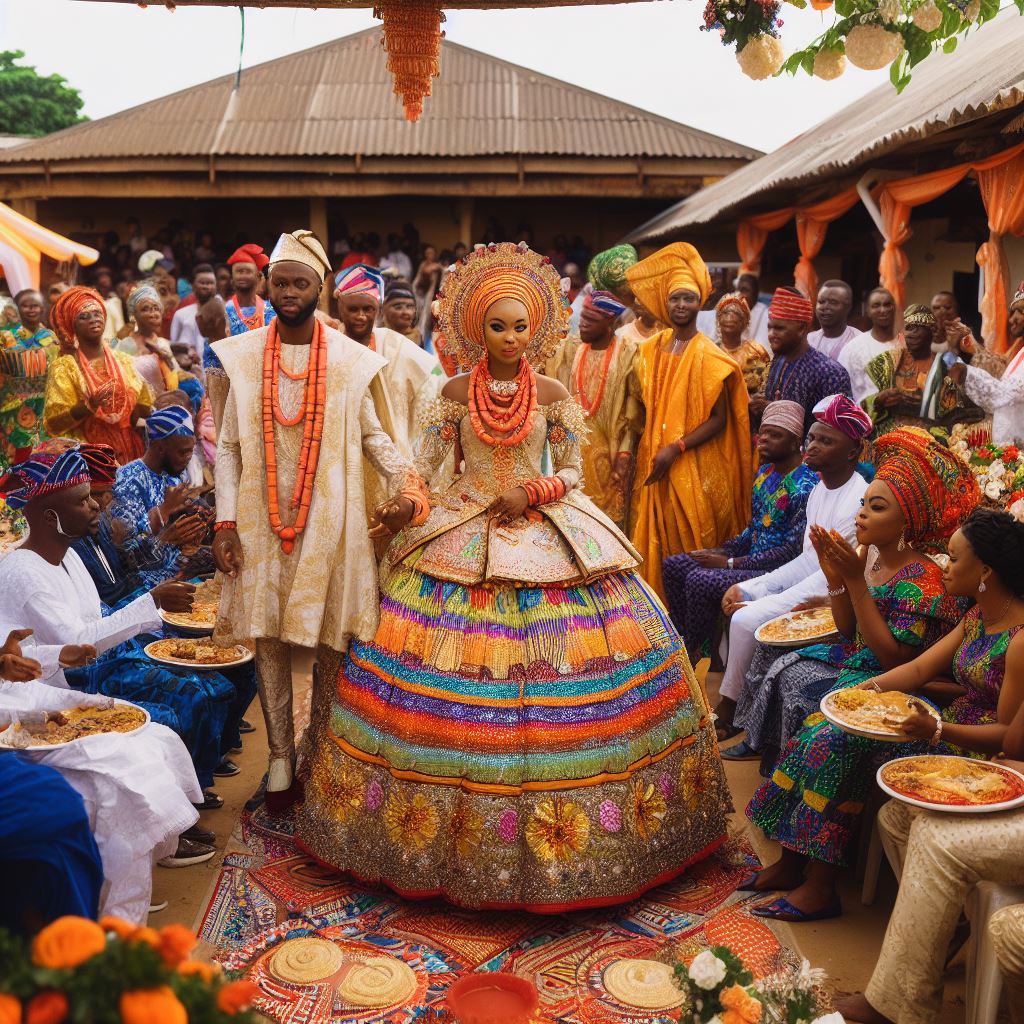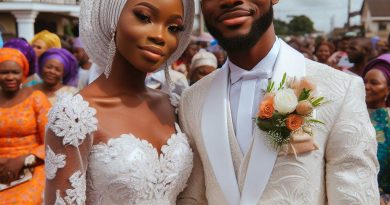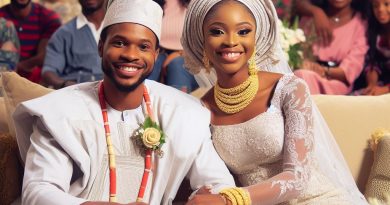Balancing Tradition and Modern Views on Marriage in Nigeria
Last Updated on January 28, 2024
Introduction
A. Balancing Tradition and Modern Views on Marriage in Nigeria
In Nigeria, the institution of marriage is a tapestry woven with threads of tradition and modernity.
B. Understanding the cultural context in Nigerian marriages
Understanding the cultural context of Nigerian marriages is paramount.
This section introduces the intricate interplay between tradition and contemporary perspectives in the realm of Nigerian matrimony.
Marriages in Nigeria are deeply rooted in cultural norms and traditions that have evolved over centuries.
Yet, in an era marked by globalization and changing societal values, the dynamics of marriage are undergoing significant transformations.
To navigate this delicate balance between the old and the new, it is crucial to grasp the cultural nuances that underpin Nigerian unions.
This exploration will unravel the rich tapestry of Nigeria’s marriage customs, emphasizing the need to reconcile tradition with modernity.
Traditional Views on Marriage in Nigeria
In Nigeria, marriage is deeply rooted in tradition, with customs, practices, and expectations shaping the union between couples.
The role of family and community is crucial in the entire marriage process, while traditional marriage ceremonies and rituals hold great significance.
A. Traditional Customs, Practices, and Expectations
Marriage in Nigeria is often seen as a union between not just two individuals, but two families.
It is a sacred institution that upholds cultural values, respect, and unity.
Traditional customs vary across various ethnic groups, but some common practices can be found.
For example, in the Yoruba culture, the introduction ceremony is an important first step, where families of the bride and groom meet to discuss the union.
This is followed by the engagement ceremony, where the groom’s family presents gifts, including clothes, accessories, and money, to the bride’s family.
Additionally, the Igbo tradition includes the “Igba Nkwu” ceremony, which involves the groom’s family paying the bride’s dowry to demonstrate their commitment.
Similarly, among the Hausa-Fulani people, the “Wushe Wushe” ceremony is conducted to bless the union, where the groom’s family presents gifts and shows respect to the bride’s family.
These customs and expectations promote unity, respect, and the preservation of cultural heritage within marriages in Nigeria.
B. Role of Family and Community
In Nigeria, the role of family and community is integral in the entire marriage process.
Family members are actively involved in choosing suitable partners, ensuring compatibility, and maintaining cultural harmony.
They play a significant role in building strong foundations for marriages.
The involvement of the extended family is particularly emphasized, as they provide support, guidance, and counseling throughout marriage preparations and beyond.
Elders and respected community members often mediate conflicts, preserving the sanctity of the union and ensuring its longevity.
Furthermore, community members participate in traditional marriage ceremonies, offering prayers, blessings, and well-wishes for the couple’s future.
This communal involvement reinforces the importance of unity and collective responsibility in marriages.
C. Significance of Traditional Marriage Ceremonies and Rituals
Traditional marriage ceremonies and rituals hold immense significance in Nigerian culture.
These ceremonies serve as platforms for honoring ancestral customs, strengthening family ties, and reaffirming cultural identity.
They are colorful events filled with traditional music, dance, and attire, creating a festive atmosphere.
Moreover, these ceremonies symbolize the official inclusion of the couple into their respective families and communities.
The rituals performed during these ceremonies, such as pouring of libations, exchange of gifts, and recitation of traditional vows, emphasize the values of commitment, loyalty, and respect.
Traditional marriage ceremonies are considered vital in bestowing blessings upon the couple, ensuring a blissful and prosperous journey throughout their married life.
Basically, traditional views on marriage in Nigeria involve various customs, practices, and expectations that serve as the foundation of marital unions.
The roles of family and community are crucial in the process, ensuring compatibility and providing support.
The significance of traditional marriage ceremonies lies in honoring cultural heritage and creating a strong bond between families.
These traditions continue to shape Nigerian marriages, blending tradition with modern values.
Read: Love in Literature: Nigerian Writers on Matrimony
Impact of Modernization on Marriage in Nigeria
In recent years, Nigeria has experienced significant modernization, westernization, and globalization.
These forces have had a profound impact on the institution of marriage in the country.
Traditional views and expectations of marriage have begun to give way to more modern and progressive ideas.
A. Influence of Modernity, Westernization, and Globalization on Nigerian Marriages
- The introduction of modern technologies, such as the internet and social media, has connected Nigerians to new ideas and perspectives on marriage.
- Western cultural influences, through media and popular culture, have shaped the way Nigerians view relationships and marital expectations.
- Globalization has led to increased intercultural marriages and relationships, breaking down traditional barriers and promoting diversity within marriages.
- Nigerians now have access to a variety of alternative relationship models, challenging traditional notions of marriage.
- Modernization has introduced economic changes that have influenced marital dynamics, as financial stability becomes a more important factor.
B. Changing Attitudes Towards Gender Roles and Marital Expectations
- Modernization has challenged traditional gender roles, as women increasingly pursue education and professional careers.
- There is a growing acceptance of egalitarian relationships, where both partners contribute equally to household and childcare responsibilities.
- The younger generation is less likely to adhere to rigid marital expectations, such as arranged marriages or marrying within one’s ethnic or religious group.
- There is a shift towards individualism and personal happiness, as Nigerians prioritize compatibility and emotional connection in their marriages.
C. Influence of Education, Urbanization, and Exposure to Different Cultures on Marriage Preferences
- Increased access to education has empowered Nigerians to make more informed choices when it comes to their marital preferences.
- Urbanization has created a multicultural environment that exposes Nigerians to different customs, traditions, and relationship models.
- Exposure to different cultures has broadened Nigerians’ perspectives on marriage, allowing them to challenge and question traditional norms.
- The desire for upward social mobility has influenced marriage preferences, as individuals seek partners who can support their educational and career goals.
Therefore, modernization, westernization, and globalization have had a significant impact on marriage in Nigeria.
Traditional views and expectations are being challenged, as Nigerians embrace new ideas and perspectives.
The changing attitudes towards gender roles, marital expectations, and preferences are a reflection of the evolving nature of Nigerian society.
As the country continues to modernize, it remains to be seen how these influences will shape the future of marriage in Nigeria.
Read: Timeless Nigerian Adages on Love, Trust, and Unity

Gain More Insights: Modern vs Traditional: Changing Nigerian Marriage Tales
Challenges in Balancing Tradition and Modern Views
Traditional and modern perspectives on marriage in Nigeria often collide, creating conflicts and challenges for those trying to reconcile these opposing ideologies.
This section explores the difficulties arising from the clash between tradition and modernity, the pressures faced by individuals striving to balance these perspectives, and the generational differences in marriage expectations.
A. Challenges Arising from Clash
- Traditional views emphasize arranged marriages and extended family involvement.
- Modern perspectives prioritize love, personal choice, and individual freedom in marriage.
- Conflicting ideologies lead to disagreements and tensions within families and communities.
B. Pressures Faced by Individuals
- Desire to maintain traditional values while embracing modern perspectives creates dilemmas.
- Fear of rejection or ostracization by relatives causes overwhelming stress.
- Societal judgment and stigma hinder open expression of desire for a balanced marriage.
C. Generational Differences in Expectations
- Older generations uphold traditional views and struggle to accept changing relationship dynamics.
- Younger generations seek love, compatibility, and personal fulfillment in modern marriages.
- Discrepancies in expectations lead to communication breakdowns and exacerbate conflicts.
In fact, clashes between tradition and modernity pose challenges in balancing marriage views in Nigeria.
Conflicts arise from differing beliefs, while individuals striving to adapt face immense pressures.
Additionally, generational disparities complicate understanding.
Open dialogue and mutual understanding are crucial to finding a harmonious balance between tradition and modernity in Nigerian marriages.
Read: Unity in Diversity: Nigerian Quotes on Interracial Marriage
Successful Balancing of Tradition and Modern Views
In order to successfully balance tradition and modern views on marriage in Nigeria, couples can look to successful marriages that have embraced both traditional and modern elements.
These examples can serve as inspiration and guidance for those seeking to create a harmonious and balanced union.
A. Examples of successful marriages that embrace both traditional and modern elements
One example of a successful balancing act between tradition and modernity is the marriage of Tunde and Nneka.
They have successfully integrated traditional Nigerian customs, such as the payment of bride price and the participation of extended family in wedding ceremonies, with modern values of gender equality and open communication.
Another example is the marriage of Ahmed and Fatima.
They have found a way to navigate the traditional expectation of arranged marriages by ensuring that their voices and desires are heard and taken into account.
They have managed to maintain respect for their families and cultural traditions while also prioritizing their personal happiness and autonomy.
B. The importance of communication, compromise, and mutual respect in achieving a balanced marriage
Communication, compromise, and mutual respect are key factors in achieving a balanced marriage that embraces both tradition and modernity.
Couples must learn to openly and honestly communicate their needs, desires, and concerns with each other.
This includes discussing their expectations regarding gender roles, family dynamics, and cultural practices.
A willingness to compromise is also crucial. Couples must be open to finding middle ground and making concessions in order to accommodate each other’s wishes and values.
This might involve compromising on wedding traditions, deciding on a hybrid approach that satisfies both partners, or creating entirely new traditions that reflect their shared values.
Mutual respect is vital in any marriage, especially when trying to balance tradition and modern views.
Each partner must respect the other’s cultural background and beliefs, as well as their personal choices and aspirations.
This respect should extend to their respective families and communities as well.
C. The benefits of maintaining cultural traditions while embracing modern ideas in a marriage
Maintaining cultural traditions while embracing modern ideas can bring numerous benefits to a marriage.
It helps to keep connections strong with families and communities, ensuring a sense of belonging and support.
Cultural traditions also provide a shared foundation and identity for the couple, helping to strengthen their bond.
At the same time, embracing modern ideas allows couples to break free from rigid gender roles and outdated practices that may hinder their individual growth and happiness.
It allows for greater equality and empowers both partners to pursue their personal and professional aspirations.
In a nutshell, successfully balancing tradition and modern views on marriage in Nigeria requires open communication, compromise, and mutual respect.
Couples can look to successful marriages that have embraced both traditional and modern elements for inspiration and guidance.
By maintaining cultural traditions while also embracing modern ideas, couples can create a harmonious and balanced union that brings numerous benefits to both partners.
Read: A Collection of Hausa Anniversary Wishes for Best Friends
Conclusion
We’ve explored the intricate interplay between tradition and modernity in Nigerian marriages.
We’ve delved into:
- The significance of cultural traditions in preserving heritage.
- The role of modern views in adapting to changing societal dynamics.
- The challenges that arise when tradition and modernity clash.
- The need to strike a balance that respects both perspectives.
Balancing tradition and modern views is not just a choice; it’s a necessity.
It fosters understanding, harmony, and respect for diverse perspectives on marriage in Nigeria.
In our rich tapestry of cultures, let’s celebrate the beauty of this diversity.


